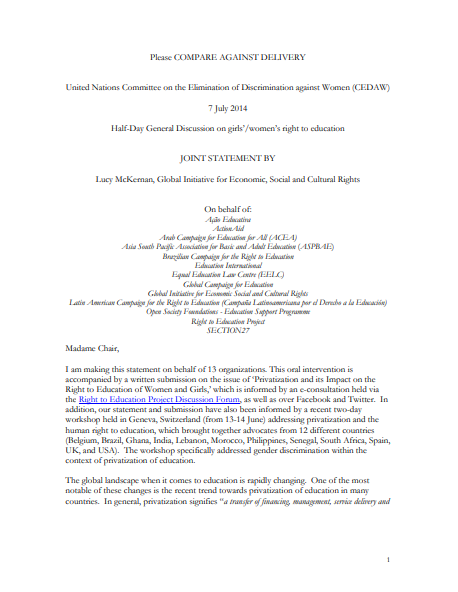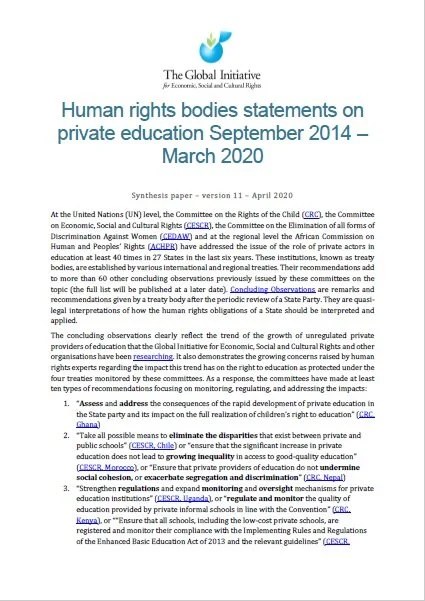Overview
Key Updates
The rapid growth of private education in many developing countries over the last decade has led to concern about issues of discrimination and segregation in accessing quality education.
As part of a broader inquiry into the shift towards private education globally, GI-ESCR together with the Moroccan Coalition on Education for All and the Forum des Alternatives Maroc, conducted empirical research and advocacy on the impact of the rapid growth of private education on the right to education in Morocco. Monitoring of the situation in Morocco is ongoing.
We regularly monitor and update information on the situation in Morocco, as it becomes available.
Morocco was reviewed by the UN Committee on the Rights of the Child on 3rd September 2014.
Review the webcast (in arabic): http://www.treatybodywebcast.org/category/webcast-archives/
Live tweeting: https://twitter.com/saubryhr
Find a blog post on the advocacy strategy used with the UN for this work, which was reposed from RTE's website
Impact
The results of the empirical research conducted in September 2012, guided advocacy efforts at the UN level with the Committee on the Rights of the Child (CRC) and the Committee on Economic, Social and Cultural Reports (CESCR). A parallel report was submitted to the Committee on the Rights of the Child which was complemented with a list of recommendations. A visual summary of key issues in the report was also available.The report to the CESCR is available in English and in French.
The Committee on the Rights of the Child issued a list of issues, which questions Morocco about its policy of privatising education. The Moroccan government responded in writing. The response was very vague and unsatisfying on the issue of private education. A follow up report was issued by GI-ESCR and partners, to highlight these failures.
In September 2014, Morocco was reviewed formally by the CRC. The Committee asked a number of questions about privatisation in education in Morocco, and recalled that education is a 'public good'. Following the review, the CRC published concluding observations at the end of September 2014 that denounce privatisation in education in Morocco. The GI-ESCR and partners organised a press conference. The report of the press conference is available here.
The outcomes from the research, as well as the concluding observations from the Committee on the Rights of the Child, were widely covered by the media. A full list of the media coverage on privatisation in education following the September 2014 press conference about the concluding observations of the CRC is available here. Examples of this press coverage include:
Partners
GI-ESCR works closely with the following local partners in Morocco
The Moroccan Coalition on Education for All(MCEFA) is a Moroccan NGO created in 2010. It is a network of more than 50 Moroccan organisations interested in the valorisation of public education in Morocco. See https://www.facebook.com/CMEPT.
The Forum des Alternative Maroc (FMAS) is a Moroccan NGO created in 2003 to promote democracy, human rights and social justice in Morocco. It works with an extensive network of national and grassroots civil society organizations in Morocco and beyond, in particular through its E-Joussour project (http://www.e-joussour.net), a Maghreb/Machrek civil society portal. See http://www.forumalternatives.org/
Contacts
Coalition Marocaine pour l’Éducation pour Tous
Ahmed Sehouate
+216 62 10 05 85(Arabic and French)
Forum des Alternative Maroc
Mustapha Hattab (Arabic and French)
+212 6 61 74 18 13
GI-ESCR
Bret Thiele: +1 218 733 1370
Sylvain Aubry: +254 7 88 28 96 34
Resources
PRIVATE ACTORS AND THE RIGHT TO EDUCATION CASELAW DATABASE
Key cases on the right to education, particularly in the context of the involvement of private actors.
Resource Database
External documents that support our advocacy efforts for the right to education.
Monitoring Tools
Materials that can support other organisations advocating for the right to education.
Concluding Observations on Private Actors in Education Database
Collection of UN Concluding Observations that related to private actors in education.






















